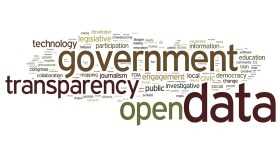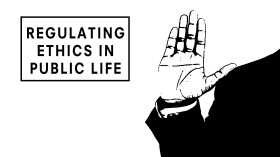
Source: Composite by G_marius based on a Lara604’s and Andrew Magill’s images
Transparency International's index measures perceptions of corruption and relies heavily on the opinions of a small group of experts and business people.
Corruption is one of the most important challenges for developed and developing nations alike. It is part of the wider problem of (lack of) ethics in politics. As citizens have less trust in government institutions, transparency, open government and fighting corruption are necessary. Governments are increasingly regulating ethics in public life. Yet to fight corruption we need to understand it and measure it properly. Transparency International's Corruption Perceptions Index (CPI) has quickly gained popularity since it was first launched in 1995. Today it is the most widely used indicator of corruption worldwide. However there is much controversy among academics and practitioners about the validity of its findings. One of the main criticisms concerns its "elite bias" and the fact that it does only measures perceptions about corruption. The CPI is build by aggregating the opinions of a relatively small group of experts and business people in each country (1). Others, for instance The Economist, criticize that a complex issue such as corruption should not be simplified to a single number on a scale, as the CPI does. There are doubts about the CPI's capacity to reflect the "real level of corruption" in societies. However this index is has also proved a very good instrument to establish comparisons across time and countries. Moreover very strong significant correlation has been found between the CPI and two other proxies for corruption: Black Market activity and overabundance of regulation (2).
Is Transparency International Corruption Perceptions Index still valid? Do you think we should keep on using the CPI or focus on a different one?
References:
(1) Transparency International, Corruption Perceptions Index Overview http://www.transparency.org/research/cpi/overview
(2) Wilhelm, Paul G. (2002). "International Validation of the Corruption Perceptions Index: Implications for Business Ethics and Entrepreneurship Education". Journal of Business Ethics (Springer Netherlands) 35 (3): 177–189.
If you change your mind, you can change your vote simply by clicking on another option.
New to netivist?
Join with confidence, netivist is completely advertisement free. You will not receive any promotional materials from third parties.
Join the debate
In order to join the debate you must be logged in.
Already have an account on netivist? Just login. New to netivist? Create your account for free.
You are viewing a filtered list of comments. Click the button above to view all comments.
THIS IS THE BEST THING THAT HAS EVER HAPPENED TO ME
I was scammed of $379,000 worth of bitcoin with a scam forest investment unknowingly then,
I didn’t know what to do.. I felt like committing suicide, but fortunately for me, my friend introduced me to a cyber crime investigator ( Mr Morris Gray )who also helps in recovering lost invested funds, After working with him, to my greatest surprise, in just few days I got all my lost funds back, and he only took just 15% out of the recovered funds, if you have been scammed with fake forex you don’t need to be scared or worried, because you can also reach him on his email: MorrisGray830@ gmail .com
He will recover your lost bitcoins back fast and smoothly...
You can WhatsApp him via +1 (607) 698-0239.
And you will be amazed….!!!
Join the debate
In order to join the debate you must be logged in.
Already have an account on netivist? Just login. New to netivist? Create your account for free.



















